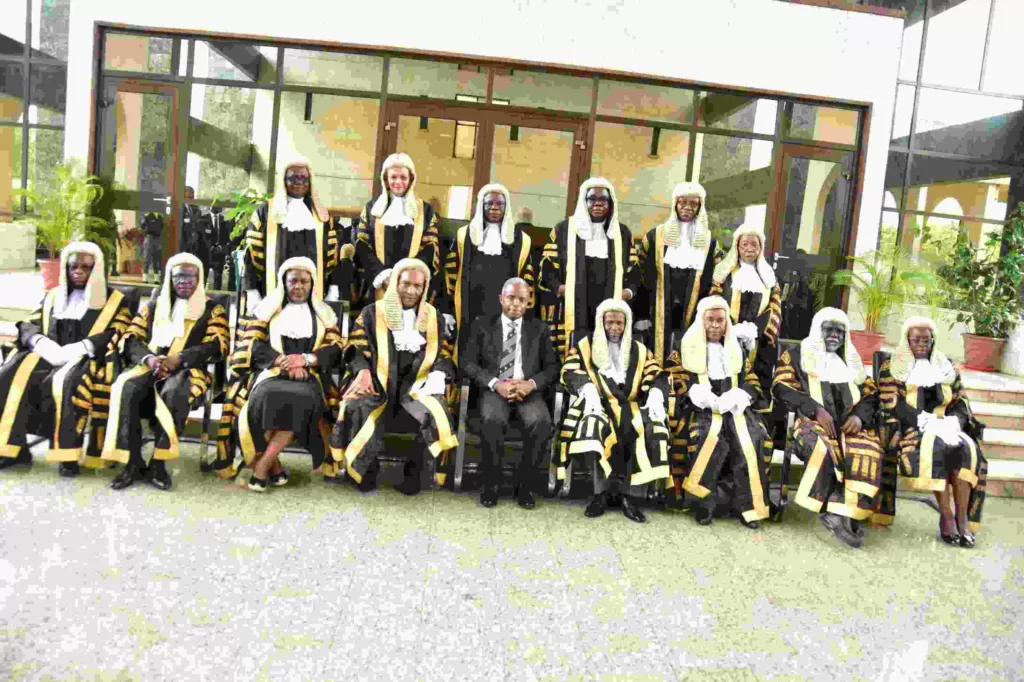Brief History of Supreme Court of Nigeria


The coinage Supreme Court was first used in 1863 by the colonial administration through the enactment of the Supreme Court Ordinance No. II which established it as a colony with civil and criminal jurisdiction.
In 1963, following the proclamation of the Federal Republic of Nigeria and the constitution which came into operation on October 1, 1963, Section III of this constitution gave legal instrument that gave birth to Supreme Court following the abolition of section 120 which abrogated the appellate jurisdiction of the judicial committee of the Privy Council which was Nigeria’s apex Court.
The Independence Constitution of 1960 invested it with the authority of the Federal Supreme Court, but this Act gave it the position of the highest Court in the judicial hierarchy.
The Supreme Court of Nigeria was explicitly referred to as such in the 1979 Constitution’s Section 210 (1) of the 1999 Nigerian Constitution. When it comes to disputes involving both federal and state laws, the court serves as the supreme court.
The Chief Justice of Nigeria and up to twenty additional justices who have been nominated by the National Judicial Council and approved by the Senate make up the Supreme Court. After reaching the mandatory service age of 70, they must retire.
Past Chief Justices
- Justice Adetokunbo Ademola, KBE, GCON 1958-1972
- Justice Taslim Olawale, CFR, GCON 1972-1975
- Justice Darnley Arthur Alexander, CBE, KCMG, CFR, GCON 1975-1979
- Justice Fatai Atanda Williams, CON, GCON 1979-1983
- Justice George Sodeinde Sowemimo, CON, GCON 1983-1985
- Justice Ayo Gabriel Irikefe, OFR, CON, GCON 1985-1987
- Justice Mohammed Bello, CON, GCON 1987-1995
- Justice Muhammawu Lawal Uwais, CON, GCON 1995-2006
- Justice S.M.A Belgore, CON, GCON 2006-2007
- Justice Idris Legbo Kutigi, CON, GCON 2007-2009
- Justice Aloysius Iyorgyer Katsina- Alu, CON, GCON 1st January 2010-28th August 2011
- Hon Justice Dahiru Musdapher 2010 – 2012
Past Justices of Supreme Court(1956 – 2013)
- Justice Stafford Foster Sutton (Past CJF)
- Justice Olumuyiwa Jibowu
- Justice Nageon Delestang
- Justice John Abbott
- Justice John Verity
- Justice Percival Cyril Hubbard
- Justice Adetokunbo Ademola (Past CJN)
- Justice Lionel Brett
- Justice Lious Nwachukwu Mbanefo
- Justice James Henley Coussey
- Justice Robert Yorke Hedges
- Justice George Frederick Dove-Edwin
- Justice Thomas Algernon Brown
- Justice Samuel Okai Qyashie-Idun
- Justice Wilfred Hugh Hurley
- Justice Alfred John Ainley
- Justice Alexander William Bellamy
- Justice William Algernon Holwell Duffus
- Justice Edgar Ignatus Godfrey Unsworth
- Justice John Idowu Conrad Taylor
- Justice Vahe Robert Bairmian
- Justice Charles Dadi Onyeama
- Justice Eugene Olufemi Adeyinka Morgan
- Justice Micheal Oguejiojo Adegbo
- Justice George Baptist Ayodola Coker
- Justice chukweike Idigbe
- Justice Ian Lewis
- Justice Charles Olusoji Madarikan
- Justice Sir Udo Udoma
- Justice Atanda Fatayi – Williams (Past CJN)
- Justice Geoge Sodeinde Sowemimo (Past CJN)
- Justice Talim Olawale Elias (Past CJN)
- Justice Dan Ibekwe
- Justice Ayo Gabriel Irikefe (Past CJN)
- Justice Darnley Arthur Raymond Alexander (Past CJN)
- Justice Muhammed Bello (Past CJN)
- Justice Mamman Nasir
- Justice Andrews Otutu Obaseki
- Justice Kayode Eso
- Justice Anthony Nnemezie Aniagolu
- Justice Buba Ardo
- Justice Augustine Nnamani
- Justice Boonyamin Oladiran Kazeem
- Justice Dahunsi Olugbemi Coker
- Justice A.G. Karibi – Whyte
- Justice Saidu Kawu
- Justice Chukwudifu Akunne Oputa
- Justice Abdul Ganiyu Olatunji Agbaje
- Justice Philip Nnaemeka – Agu
- Justice Abubakar Bahir Wali
- Justice Ebenezer Babasanya Craig
- Justice Olajide Olatawura
- Justice Ephraim Ibukun Akpata
- Justice Uche Omo
- Justice Bolarinwa Oyegoke Babalakin
- Justice Paul kemdilim Nwokedi
- Justice Micheal Ekundayo Ogundare
- Justice Emmanuel Obioma Ogwuegbu
- Justice Shehu Usman Muhammed
- Justice Yekini Olayiwola Adio
- Justice Okay Achike
- Justice Emmanuel Olayinka Ayoola
- Justice Ignatius Chukwudi Pats – Acholonu
- Justice Anthony Ikechukwu Iguh
- Justice Uthman Mohammed
- Justice Dennis Onyejife Edozie
- Justice Samson Odemwingie Acholonu
- Justice U.A. Kalgo
- Justice Akintola Olufemi Ejiwunmi
- Justice Muhammadu Lawal Uwais (Past CJN)
- Justice S. M. A Belgore (Past CJN)
- Justice Sunday Akintola Akintan
- Justice Sylvester Umar Onu
- Justice P. O. Aderemi
- Justice I. L. Kutigi (Past CJN)
- Justice G.A. Oguntade
- Justice J. O. Ogebe
- Justice Niki Tobi
- Justice I. F. Ogbuagu
- Justice A. I. katsina – Alu (Past CJN)
- Justice Dahiru Musdapher (Past CJN)
- Justice F. F. Tabai
- Justice Olufunlola O. Adekeye
Present Justices of The Supreme Court


- The Hon. Justice Aloma Mariam Mukhtar, (CON) CJN
- The Hon. Justice Mahmud Mohammed, (CON)
- The Hon. Justice Walter Samuel Nkanu Onnoghen, (CON)
- The Hon. Justice Francis Fedode Tabai, (CON)
- The Hon. Justice Ibrahim Tanko Muhammed, (CON)
- The Hon. Justice Christopher Mitchell Chukwuma-Eneh, (CON)
- The Hon. Justice Muhammed Saifullah Muntaka-Coomassie, (CON)
- The Hon. Justice John Afolabi Fabiyi, (CON)
- The Hon. Justice Olufunola Oyelola Adekeye, (CON)
- Hon. Justice Suleiman Galadima, (OFR)
- Hon. Justice Bode Rhodes-Vivour
- Hon. Justice Mary Peter-Odili
- Hon. Justice Sylvester Ngwuta
- Mr. Sunday Olorundahunsi Esq. CHIEF REGISTRAR
What Is The Highest Court In Nigeria?
The Supreme Court of Nigeria is the Highest Court In Nigeria and holds the highest authority in the country’s judicial system. Established under the Nigerian Constitution, the Supreme Court serves as the final appellate court, which means its decisions are binding on all other courts in Nigeria. It is the court of last resort, and its rulings cannot be appealed further within the Nigerian judicial system.




